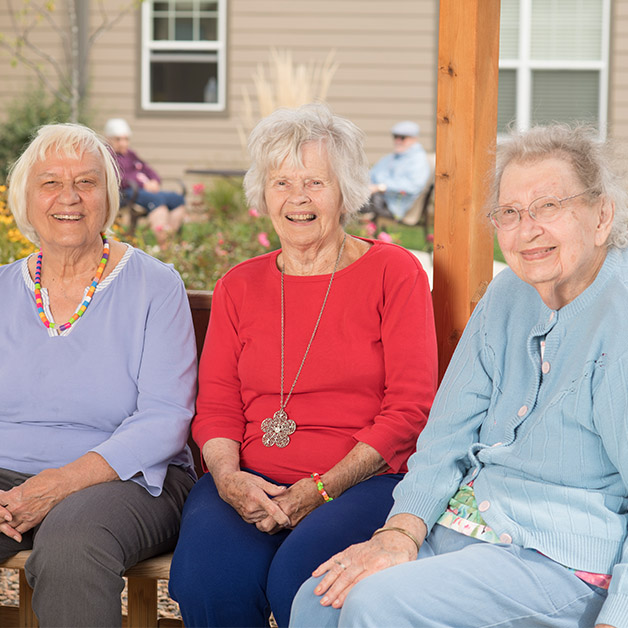Memory Care Charlotte: Specialized Senior Living for Memory Loss
Memory Care Charlotte: Specialized Senior Living for Memory Loss
Blog Article
Engaging Activities in Memory Treatment: Enhancing Well-being at Home
In the world of memory care, the significance of interesting tasks can not be overemphasized. These activities work as a cornerstone in enhancing the general health and wellbeing of individuals coping with memory problems. By taking advantage of numerous sensory experiences, including acquainted leisure activities, discovering the extensive link in between songs and memory, and participating in mind-boosting video games, a globe of opportunities unravels (Memory Care Charlotte). The impact of such tasks gets to much past simple enjoyment; it has the power to unlock memories, promote cognition, and promote a sense of joy and satisfaction.
Advantages of Engaging Tasks
Engaging activities play a vital duty in improving cognitive function and psychological health in people obtaining memory care in your home. These activities are created to stimulate the mind, urge social interaction, and provide a sense of purpose for those experiencing memory loss. By participating in tasks such as puzzles, memory treatment, music treatment, and art tasks, individuals can enhance their cognitive abilities, memory retention, and general top quality of life.
One significant benefit of appealing activities is the favorable influence they carry cognitive function. Tasks that test the mind, such as word games or brain intros, help enhance memory, focus, and analytic abilities. This psychological excitement is vital for individuals with memory disabilities as it can decrease cognitive decline and improve brain feature.
Additionally, involving activities also promote emotional wellness by lowering sensations of isolation and anxiety. Participating in team tasks or one-on-one sessions with caretakers can enhance state of mind, boost self-esteem, and create a feeling of belonging. These psychological benefits are necessary for maintaining a favorable outlook and overall psychological health and wellness in individuals receiving memory treatment at home.
Creating a Sensory Experience

Including sensory experiences can be achieved with different activities. Furthermore, incorporating acquainted scents like lavender or freshly baked cookies can evoke positive memories and feelings of convenience.
Incorporating Familiar Leisure Activities
Incorporating familiar pastimes into memory care tasks in your home can supply a sense of connection and joy for people with memory disabilities. Engaging in activities that people have actually enjoyed throughout their lives can evoke favorable emotions, stimulate memories, and foster a sense of accomplishment. Whether it's painting, knitting, gardening, or playing a music tool, acquainted pastimes use a significant and comforting method for individuals with memory obstacles to get in touch with their past selves and keep a sense of identity.
By incorporating familiar pastimes right into daily routines, caregivers can develop a feeling of normalcy and function for their enjoyed ones. These tasks not just act as a source of home entertainment but likewise assist in lowering anxiousness, boosting state of mind, and promoting index cognitive function. In addition, taking part in acquainted leisure activities can stimulate conversations, urge social interactions, and improve total wellness.
Caretakers need to adapt these pastimes to fit the individual's existing abilities and passions, ensuring a safe and satisfying experience. Offering the required support and encouragement, caretakers can help individuals with memory disabilities remain to find gratification and happiness through their favorite activities.
Music and Memory Connection
The partnership in between music and memory is a effective and well-documented sensation, demonstrating substantial impacts on cognitive function and psychological well-being. Memory Care Charlotte. In the context of memory treatment, leveraging this link can be an important device in boosting the quality of life for people coping with memory disabilities
Music has an unique capacity to evoke feelings and memories from the past, even in people with special info innovative stages of mental deterioration. Paying attention to acquainted songs or taking part in music treatment sessions can stimulate neural pathways related to memory and feeling, improving and setting off memories mood. Engaging with music can help decrease anxiety, tension, and anxiety typically experienced by people with cognitive decrease.
Caregivers and relative can incorporate songs into day-to-day regimens by creating individualized playlists of beloved tracks, organizing sing-along sessions, or motivating individuals to play music tools. By incorporating songs into memory treatment activities, it is feasible to create purposeful experiences that promote cognitive stimulation, emotional link, and general well-being in people with memory impairments.
Mind-Boosting Gamings

Games like crossword puzzles, Sudoku, memory matching games, and trivia quizzes are popular options for individuals in memory care. These activities not only give home entertainment however also offer a structured way to exercise these details the brain. Furthermore, games that involve method and vital reasoning, such as chess or card video games, can assist enhance cognitive skills and reasoning abilities.
Additionally, these mind-boosting video games can have a positive effect on mood and psychological health. Taking part in delightful tasks and experiencing success in solving problems or finishing difficulties can boost self-confidence and self-esteem. On the whole, integrating mind-boosting games right into a memory treatment routine can add significantly to the total lifestyle for individuals with memory disabilities.
Conclusion
Finally, involving activities in memory care play a crucial duty in improving wellness in your home. By developing sensory experiences, incorporating acquainted hobbies, discovering the music and memory connection, and involving in mind-boosting video games, people can improve their cognitive capabilities and total quality of life. These activities supply psychological stimulation, social interaction, and a sense of objective, ultimately resulting in a much more meeting and improving experience for those dealing with memory problems.
Structure on the foundation of cognitive and psychological benefits derived from involving tasks, the unification of sensory experiences can additionally enhance the wellness of people obtaining memory treatment at home. For people with memory disabilities, sensory tasks can stimulate memories, minimize stress and anxiety, and enhance general mood.
Integrating familiar pastimes into memory care tasks at home can provide a feeling of continuity and joy for people with memory problems.Games like crossword puzzles, Sudoku, memory matching games, and trivia tests are prominent options for individuals in memory care. Overall, including mind-boosting video games into a memory treatment routine can contribute substantially to the overall quality of life for people with memory impairments.
Report this page